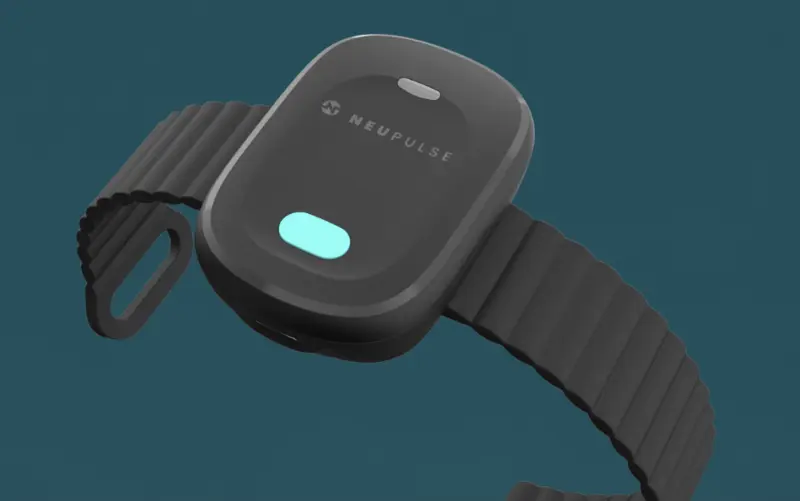Ask a researcher: your questions answered
We put your questions to our research experts, including two of our funded researchers Dr Petra Priotsi and Professor Stephen Jackson.
Meet the research experts



Stephen, can you tell us more about the device you're working on?
The device we are working on is shown in the image below. It is worn on the underside of the wrist and it delivers weak, non-painful, electrical pulses to the nerves at the wrist. Many people report that they find this stimulation relaxing, and it looks like it substantially reduces tremor in Parkinson’s.
We’re also finding that stimulation alters the brain activity associated with other movement symptoms in Parkinson’s, and makes people feel less anxious and more relaxed. We’ve not yet investigated how stimulation affects other non-movement symptoms of Parkinson’s. We are intending that, once we have obtained regulatory approval, (hopefully next year) people will be able to buy this device directly.

How does the device work and how will you know who will benefit from it?
Stephen: The device works by delivering mild and painless electrical stimulation to the nerves in the wrist, which travel to the brain areas involved in the generation of movement. These brain areas are involved in the movement symptoms of Parkinson’s. The aim of the device is to disrupt the dysfunctional brain network activity that could be producing the movement symptoms of Parkinson’s, thereby allowing more regular movement to be restored.
So far, we have evidence to show that stimulation reduces tremor and reduces the dysfunctional brain activity linked to other movement symptoms. But we’re looking for more people who can travel to the University of Nottingham, to take part and test the device. You can find out more about how to take part in this research opportunity on the Take Part Hub.
How can I find and join research trials that are suitable for me, particularly those addressing my specific symptoms?
Research Communications team: Taking part in research trials is a brilliant way to get involved and contribute towards finding better treatments for Parkinson’s. The best way to find studies that are right for you is to visit our Take Part Hub. Simply search using your postcode and you’ll find the latest research looking for participants in your local area.
For some research projects, researchers may be looking for a specific group of people to take part, such as those that have Parkinson’s or a related condition, or experience a particular symptom, or those that have been recently diagnosed. Others might be looking for people without Parkinson’s.
You can also hear about the latest opportunities to get involved in Parkinson’s research by joining our Research Support Network. We’ll send studies filtered by your location, along with research news updates and events, straight to your inbox.
Petra, how can your research help us learn more about genetics in Parkinson's and what might be an early sign or risk factor by looking at the blood samples?
Our study uses data from genes and molecules (such as fats) taken from donated blood samples of thousands of healthy participants. Some of these participants later developed Parkinson’s—sometimes more than 15 years after giving their blood. By applying computer algorithms, we look for patterns in their genes and molecules that differ between people who developed Parkinson’s and those who did not. These patterns could help us spot early warning signs or risk factors long before symptoms appear.
My Parkinson's symptoms change over time but it's hard to know how they will progress. How does your research focus on understanding that rate of progression?
Petra: We have information from a very large group of people with Parkinson’s about how quickly their movement and memory symptoms have changed over time. By analysing their genetic and molecular data, we aim to find patterns or profiles that are linked to faster or slower progression. This could help us predict how Parkinson's might develop in different people and in the future ultimately guide more personalised treatments.
One of my biggest problems is falling, due to loss of balance, freezing or festination (taking short, fast steps). What research is going on to tackle these symptoms?
Research Communications team: We’re funding many studies that are looking at non-drug treatments for balance and falls. Dr. Will Young at Exeter University is expanding on earlier work with the Parkinson’s community to co-develop weight-shifting video exercises. A small study showed these videos helped many participants overcome freezing. Now, the team aims to improve the videos and share them more widely with a focus on inclusivity.
We’re also funding studies developing physical activity programmes to help improve balance and movement in Leicester, Glasgow and Northumbria. You can find out more about these projects and all of our funded research in our research projects document.
What is the Parkinson’s research discovery you are most excited about that you think will make the most difference?
Stephen: Our current research was motivated by the requests we received from people with Parkinson’s worldwide. We had published a clinical trial showing the rhythmic electrical stimulation of the nerves in the wrist could substantially reduce the motor and vocal tics in people with Tourette syndrome. Following the publicity that this work had, we received many enquiries asking if this approach could also work for people with Parkinson’s. Our exciting discovery was that this looks very likely, and we were tremendously grateful to Parkinson’s UK when they agreed to fund our project to investigate this.
We’re also very excited about the possibility of using other non-invasive brain stimulation methods to develop alternatives to deep brain stimulation, but that is another story!
What current areas of research might hold answers to finding better treatments for Parkinson’s?
Research Communications team: As the leading European funder of Parkinson's research we’re determined to understand more about the causes of the condition, find better treatments and a cure.
Momentum is gathering. Though in the early stages of research, gene therapy and cell therapy are opening up new treatment options. Combined with efforts to better diagnose Parkinson’s and understand how it progresses, we’re getting closer to finding better ways to treat the condition.
One avenue involves alpha-synuclein, a protein linked to Parkinson’s. A large phase 3 study we’re funding is exploring whether a repurposed drug, called ambroxol, may clear away this troublesome protein. The study will see if it’s effective at slowing down, or even stopping Parkinson’s symptoms getting worse. Read more about the ambroxol study in our news story.
There is a tremendous amount of work being done right across the Parkinson's spectrum. How optimistic are you that we will see a major breakthrough in Parkinson’s in the near future?
Petra: I am cautiously optimistic. In dementia research, we have recently seen the first new drugs that can slow Alzheimer’s, and that has given us real hope. Parkinson’s research is also moving forward at great speed, with huge amounts of new data and powerful new methods to analyse it.
While we don’t yet have a cure, the progress being made makes me hopeful that major breakthroughs are on the horizon.
Want to know more?
Check out some of our recent blogs and podcasts for more information about other hot topics in research:
- What’s the latest on stem cell therapy?
- What’s the research behind different diets and supplements for Parkinson’s?
- What do we know about cannabis or CBD for Parkinson’s?
- What impact do pesticides or the environment have on Parkinson’s?
- What’s the latest research on pain? (Podcast)
- How are researchers working on better tests for diagnosing and monitoring Parkinson’s?
- What’s happening to try and speed up clinical research trials?
Still got a question about Parkinson’s research?
Catch up on Par-Con, our Parkinson’s community convention, which took place online and in Birmingham on 24 and 25 October. You can watch back all the sessions online, including on many of the topics covered in this blog, from diets to stem cells and beyond.

